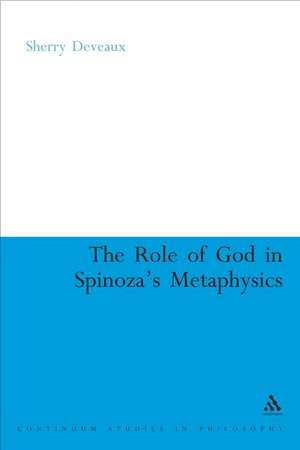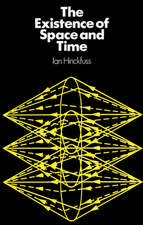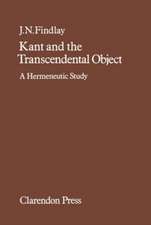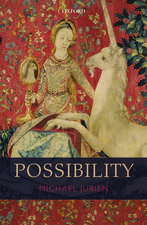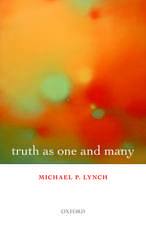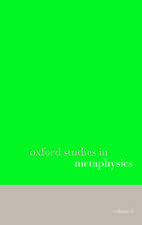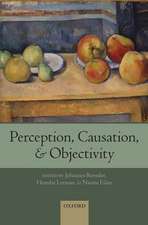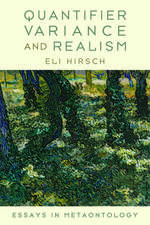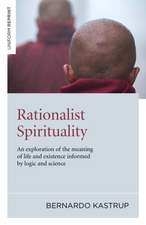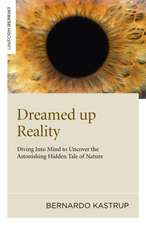The Role of God in Spinoza's Metaphysics: Continuum Studies in Philosophy
Autor Sherry Deveauxen Limba Engleză Hardback – 25 feb 2007
Baruch Spinoza began his studies learning Hebrew and the Talmud, only to be excommunicated at the age of twenty-four for supposed heresy. Throughout his life, Spinoza was simultaneously accused of being an atheist and a God-intoxicated man. Bertrand Russell said that, compared to others, Spinoza is ethically supreme, 'the noblest and most lovable of the great philosophers'. This book is an exploration of (a) what Spinoza understood God to be, (b) how, for him, the infinite and eternal power of God is expressed, and (c) how finite human beings can have a true idea of this greatest of all entities. Sherry Deveaux begins with an analytic discussion of these three questions, and an explication of three different views held by contemporary commentators on Spinoza. She then shows that the commonly held views about Spinoza are inconsistent with Spinoza's texts, especially his magnum opus, the Ethics. Next comes an analysis of topics in Spinoza that must be understood in order correctly to answer the three questions. For example, the notions of 'power' and 'true idea' are discussed, along with Spinoza's definition of the 'essence' of a thing, which is shown to be central to the discussion of Spinoza's God. Deveaux then claims that Spinoza defines God's essence as 'absolutely infinite and eternal power' and that, contrary to the commonly held view that God's essence is identical with the attributes (e.g., thought and extension), God's essence or "power" is expressed through the attributes.
Din seria Continuum Studies in Philosophy
-
 Preț: 255.58 lei
Preț: 255.58 lei -
 Preț: 256.59 lei
Preț: 256.59 lei - 22%
 Preț: 256.29 lei
Preț: 256.29 lei - 31%
 Preț: 890.62 lei
Preț: 890.62 lei - 18%
 Preț: 304.66 lei
Preț: 304.66 lei -
 Preț: 254.93 lei
Preț: 254.93 lei - 24%
 Preț: 249.00 lei
Preț: 249.00 lei - 22%
 Preț: 889.49 lei
Preț: 889.49 lei - 31%
 Preț: 890.86 lei
Preț: 890.86 lei - 22%
 Preț: 1064.84 lei
Preț: 1064.84 lei - 31%
 Preț: 947.54 lei
Preț: 947.54 lei - 23%
 Preț: 255.11 lei
Preț: 255.11 lei - 31%
 Preț: 888.74 lei
Preț: 888.74 lei - 31%
 Preț: 890.72 lei
Preț: 890.72 lei - 22%
 Preț: 1005.49 lei
Preț: 1005.49 lei - 22%
 Preț: 946.72 lei
Preț: 946.72 lei -
 Preț: 254.75 lei
Preț: 254.75 lei - 22%
 Preț: 1005.98 lei
Preț: 1005.98 lei -
 Preț: 255.19 lei
Preț: 255.19 lei - 31%
 Preț: 889.15 lei
Preț: 889.15 lei - 31%
 Preț: 1006.06 lei
Preț: 1006.06 lei - 22%
 Preț: 889.23 lei
Preț: 889.23 lei - 22%
 Preț: 947.86 lei
Preț: 947.86 lei - 22%
 Preț: 256.49 lei
Preț: 256.49 lei - 31%
 Preț: 888.58 lei
Preț: 888.58 lei - 14%
 Preț: 1006.24 lei
Preț: 1006.24 lei - 31%
 Preț: 891.51 lei
Preț: 891.51 lei - 22%
 Preț: 1005.89 lei
Preț: 1005.89 lei -
 Preț: 256.38 lei
Preț: 256.38 lei - 31%
 Preț: 1152.60 lei
Preț: 1152.60 lei - 23%
 Preț: 255.38 lei
Preț: 255.38 lei - 22%
 Preț: 1006.72 lei
Preț: 1006.72 lei - 31%
 Preț: 946.72 lei
Preț: 946.72 lei - 22%
 Preț: 257.76 lei
Preț: 257.76 lei - 22%
 Preț: 1005.18 lei
Preț: 1005.18 lei -
 Preț: 256.49 lei
Preț: 256.49 lei -
 Preț: 256.38 lei
Preț: 256.38 lei - 31%
 Preț: 1003.53 lei
Preț: 1003.53 lei -
 Preț: 258.42 lei
Preț: 258.42 lei - 19%
 Preț: 464.39 lei
Preț: 464.39 lei - 22%
 Preț: 1005.89 lei
Preț: 1005.89 lei - 22%
 Preț: 1005.56 lei
Preț: 1005.56 lei - 11%
 Preț: 465.66 lei
Preț: 465.66 lei - 22%
 Preț: 1006.62 lei
Preț: 1006.62 lei - 13%
 Preț: 255.66 lei
Preț: 255.66 lei
Preț: 888.16 lei
Preț vechi: 1032.75 lei
-14% Nou
Puncte Express: 1332
Preț estimativ în valută:
169.94€ • 177.92$ • 140.62£
169.94€ • 177.92$ • 140.62£
Carte tipărită la comandă
Livrare economică 05-19 aprilie
Preluare comenzi: 021 569.72.76
Specificații
ISBN-13: 9780826488886
ISBN-10: 0826488889
Pagini: 152
Dimensiuni: 156 x 234 x 17 mm
Greutate: 0.38 kg
Editura: Bloomsbury Publishing
Colecția Continuum
Seria Continuum Studies in Philosophy
Locul publicării:London, United Kingdom
ISBN-10: 0826488889
Pagini: 152
Dimensiuni: 156 x 234 x 17 mm
Greutate: 0.38 kg
Editura: Bloomsbury Publishing
Colecția Continuum
Seria Continuum Studies in Philosophy
Locul publicării:London, United Kingdom
Caracteristici
This ground-breaking new monograph will set a new agenda in Spinoza studies
Cuprins
Introduction
Chapter 1. Three Problems: the relation of God to the attributes; the essence of God; the true conception of God Chapter 2. The "God is the Thing that has Attributes and Modes as Properties" Interpretation
Chapter 3. The "God is the Collection of Attributes" Interpretation
Chapter 4. The "God is the Totality of Attributes" Interpretation
Chapter 5. Benefits and Disadvantages of the Three Interpretations
Chapter 6. Essences and True Ideas in Spinoza
Chapter 7. The Essence of Spinoza's God
Selected Bibliography
Index
Chapter 1. Three Problems: the relation of God to the attributes; the essence of God; the true conception of God Chapter 2. The "God is the Thing that has Attributes and Modes as Properties" Interpretation
Chapter 3. The "God is the Collection of Attributes" Interpretation
Chapter 4. The "God is the Totality of Attributes" Interpretation
Chapter 5. Benefits and Disadvantages of the Three Interpretations
Chapter 6. Essences and True Ideas in Spinoza
Chapter 7. The Essence of Spinoza's God
Selected Bibliography
Index
Recenzii
"Deveaux offers scholars a significant new interpretation of Spinoza's God that challenges and ultimately rejects the interpretations of Jonathan Bennett, Edwin Curley, Alan Donagan, H. F. Hallett, and Steven Parchment. She shows how these interpretations involve insoluble problems, while her interpretation, which is indebted to Michael Della Rocca, can avoid these problems. This is a stimulating work, particularly for those attracted by the profundity of the metaphysics and vision of God found in Spinoza's Ethics." -Michael Strawser, Philosophy in Review
-Mention. The Chronicle of Higher Education/ May 11, 2007
"This book is essential reading for anyone seeking to understand Spinoza's metaphysics." - Don Garrett, New York University
"In my view, Sherry Deveaux has made the strongest case for the simplicity of Spinoza's God in the history of Spinoza scholarship."- Joel I. Friedman, Professor Emeritus, University of California, Davis
"As such, it is an important contribution and one worth remembering in subsequent interpretations of Spinoza's account of God." - Steve Parchment, Journal of the History of Philosophy, July 2008
-Mention. The Chronicle of Higher Education/ May 11, 2007
"This book is essential reading for anyone seeking to understand Spinoza's metaphysics." - Don Garrett, New York University
"In my view, Sherry Deveaux has made the strongest case for the simplicity of Spinoza's God in the history of Spinoza scholarship."- Joel I. Friedman, Professor Emeritus, University of California, Davis
"As such, it is an important contribution and one worth remembering in subsequent interpretations of Spinoza's account of God." - Steve Parchment, Journal of the History of Philosophy, July 2008
